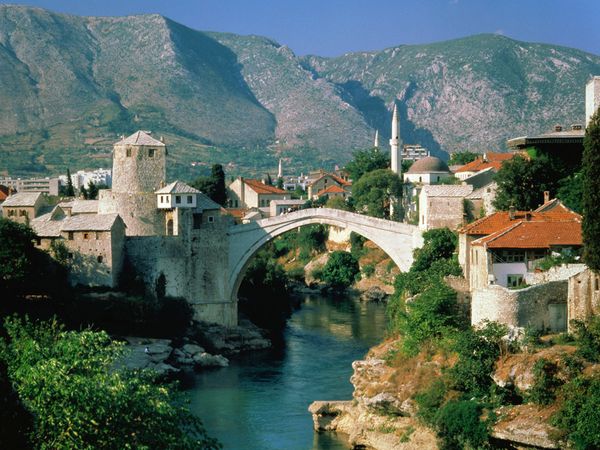Nino Tlashadze
After a long and complicated preparation period, on July 30, we landed in Sarajevo. Despite scary landing caused by bad weather conditions, I was deeply impressed with the beauty of the city. I do not know whether it is unlucky coincidence or purposeful decisions but it is evident that recent armed conflicts in the Eastern Europe were launched in the most beautiful regions and states– Abkhazia, South Ossetia, Nagorno Karabakh, Transnistria, Bosnia - Herzegovina and now Crimea… they are beautiful, in fact - paradises on the earth.
1990s were the most turbulent and bloody period for the Eastern Europe. Empires fell apart but new states emerged at the expense of lives of thousands of peaceful civilians. Scope of human and material loss differed but the tragedy which Balkan states endured after the collapse of Yugoslavia is beyond all boundaries.
In 1990s, seven independent states emerged after the collapse of the Socialist Yugoslavia: Serbia, Bosnia I Herzegovina, Croatia, Kosovo, Montenegro, Macedonia and Slovenia1. About 100 000 people were killed in the armed conflicts in the Balkans; among them were civilians – children, women and elderly. The countries received huge loss. Impact of the war is still evident in those countries.
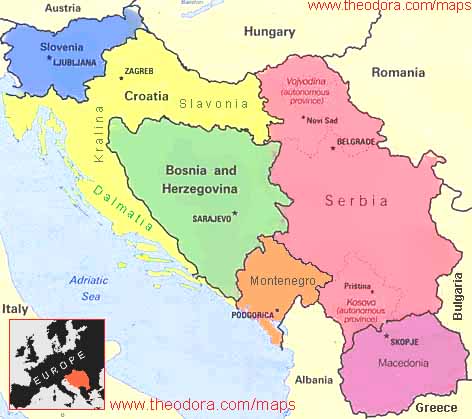
We travelled to Balkans - Bosnia I Herzegovina (BiH) and Serbia, in the frame of the project Coalition for Rebuilding Trust. Norwegian Helsinki Committee implements the project in the South Caucasus together with local partner organizations. Human Rights Center is a co-partner in it. The purpose of one-week study trip was to see how Bosniak Muslims, Serbs and Croats managed to co-exist in BiH after bloody and brutal conflicts2.
There is presidency of Bosnia and Herzegovina with three members- Bosnian, Serb and Croat. They change every 6 month. Problems of fragile co-existence became obvious on the very first day – towns and villages are divided according to ethnic belongings. Problems of fragile co-existence became obvious on the very first day – towns and villages are divided according to ethnic belongings. Still, representatives of all three communities manage to peacefully cooperate in governmental, administrative or private institutions in Sarajevo and several big cities. Children from different communities study in different schools but there are exceptions – we were told about a project in the frame of which integration of Muslim and Serb children and their parents was successfully achieved. In most cases, Serbs and Bosniak Muslims prefer to live and work separately. Considering all aforementioned circumstances you become sure that 20-year-long peaceful co-existence is very fragile – ordered/compelled by external stakeholders.
After still uncured wounds from armed conflicts in Abkhazia and South Ossetia I hardly expected myself to be touched with the conflicts of other countries. Sarajevo – outstandingly beautiful capital of BiH spent 1 425 days (almost 4 years from April 5, 1992 to February 29, 1996) under the siege of the Republika Srpska army. The story reminded me of the 2008 August Russian Georgian war and ten-day siege of my native town Gori in Georgia. Those ten days were the most tragic memories from my past life but when you realize that at the end of 20th century people had to endure a lot of ten-days just in the middle of Europe, 500 kilometers away from Vienna and Rome, of course you feel yourself very unprotected and weak; the worst thing is that you start losing trust towards European institutions that is easily detected in almost every second citizen of BiH. It took almost four years for EU member states, Russia and USA to reach agreement and put an end to the massacre in BiH. More than 14 000 people died during the siege; among them were peaceful population – children, women and elderly. World leaders were watching the ongoing tragedy sitting at the negotiation table and could not reach agreement. People tell horror stories; stories of victim women and men are written on the stands in the Sarajevo Museum; they are extracts from the testimonies to Hague Tribunal and International Criminal Tribunal for former Yugoslavia – stories of rape, torture and murder of their beloved and children just in front of their eyes.
After the war, the International Criminal Tribunal for the former Yugoslavia (ICTY) convicted two Serb officials for numerous counts of crimes against humanity committed during the siege. Stanislav Galić and Dragomir Milošević were sentenced to life imprisonment and 29 years imprisonment respectively. Momčilo Perišić and former President of Republika Srpska Radovan Karadzic received long term sentences for the Sarajevo siege3.
The third day of the study trip was the most difficult for all participants of the visit. Srebrenica… bloody place of massacre4. The memorial cemetery with 8 372 Bosniak Muslims buried in it is stretched out on the vast field. They were killed by combatants of the Republika Srpska Army on July 11-19, 1995. Ratko Mladic – author and orchestra director of that bloody massacre is still waiting for his sentence at the Hague International Tribunal; he is accused of war crimes, crimes against humanity and genocide. He has often been referred
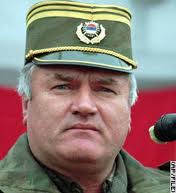 to by Western media as the "Butcher of Bosnia," a title also sometimes appliedto Radovan Karadžić, the former Presi dent of Republika Srpska.
to by Western media as the "Butcher of Bosnia," a title also sometimes appliedto Radovan Karadžić, the former Presi dent of Republika Srpska.
Victim of July 1995 massacre Hassan told us the story about the tragedy in the Srebrenica Memorial Cemetery. His three brothers and father were killed by the combatants of the Republika Srpska’s army. He was only 19 then and survived the massacre together with his mother. It is hard to believe that Dutch unit of UN Peacekeepers could not give shelter to 25 000-30 000 Bosniak Muslims, when they fled from Srebrenica after Mladic entered the town together with his army. Since the UN peacekeeping mission did not have right to use guns, the Dutch peacekeepers left civilians unprotected before the Mladic’s army. Finally they managed to rescue them and send children and women to the safe city of Tuzla by buses. Men, including adults older than 12, had to stay in front of the Mladic army. It is horrible to listen to the stories of mothers, who had to part with their 12-year-old sons in Srebrenica and tr avel to Tuzla. Since then they have not seen their sons… many of them could not even find corpses of their sons; DNA analysis are still going on5.
Only small part of civilians from Srebrenica managed to escape brutal executors of Mladic and fled to Tuzla across mountains and forests; the combatants chased and killed them on the way; others died of hunger and thirst; only small part managed to reach the safe place – Hassan and his mother were among survivors.
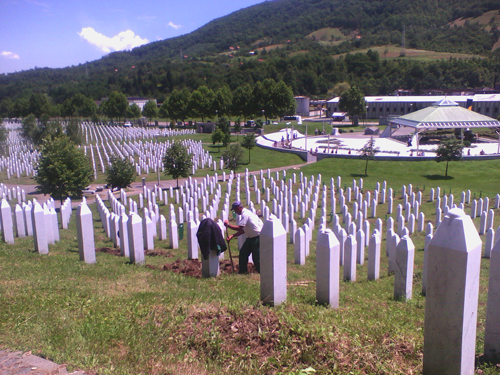
Survived Bosniak Muslims and Georgian IDPs from Abkhazia, who fled from Abkhazia across mountain range of Caucasus, have much common tragic memories.
In 2005, in a message to the tenth anniversary commemoration of the genocide, the Secretary-General of the United Nations noted that, while blame lay first and foremost with those who planned and carried out the massacre and those who assisted and harboured them, great nations had failed to respond adequately, the UN itself had made serious errors of judgment and the tragedy of Srebrenica would haunt the UN's history forever.
Because of late and in some cases inadequate response of UN and other international stakeholders, majority of Bosnian Muslims have lost trust towards those institutions and wish restoration of former Yugoslavia Socialist “empire”. They say the Empire was not at all similar to the Soviet Union; nobody was repressed and people lived in complete freedom; it was European socialist state and all nations coexisted in peace; the most important is that they did not hate each other. Nowadays, their coexistence is so artificial and fragile that a new tragedy might easily happen in the middle of Europe…
We left BiH behind and travelled to Serbia. We met representatives of several local nongovernmental organizations, which work on human rights, Rule of Law and investigation of war crimes. Almost all of them admit the genocide in BiH. Furthermore, in 2013 Serbia's
President, Tomislav Nikolic, has apologised for all "crimes" committed by Serbs during the break-up of Yugoslavia, including Srebrenica but he refused to call the killing of thousands of Bosnian Muslims an act of genocide, as recognised by UN war crimes prosecutors. So, I doubt Nikolic’s statement was sincere; more likely he aimed to please EU on their way towards EU and NATO integration. I wonder what will be the “value” of EU and NATO’s pardoning to Serbia for the genocide in former Yugoslavia and when it will happen.
Every citizen of Germany still pays “tribute” to Jewish people for the crimes committed by their ancestors during the World War II. Is Serb population ready to do the same? Unfortunately, we could not receive clear answer to this question during our trip in Belgrade. On the other hand, it will be very unfair if Serbia is accepted into EU or NATO without any sanctions; then Bosniak Muslims and other victims of Serbian genocide in the territory of former Yugoslavia will finally lose trust to those institutions.

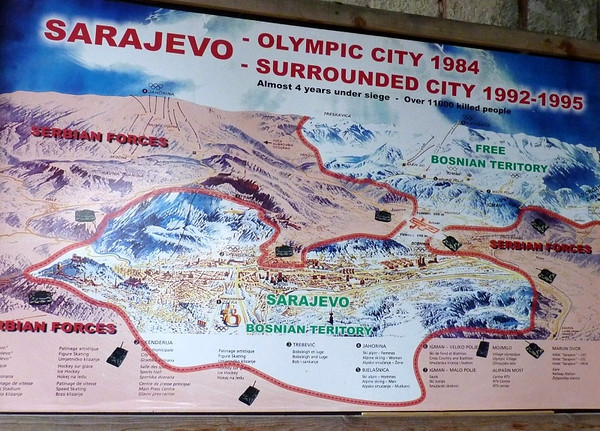
 to by Western media as the "Butcher of Bosnia," a title also sometimes appliedto Radovan Karadžić, the former Presi dent of Republika Srpska.
to by Western media as the "Butcher of Bosnia," a title also sometimes appliedto Radovan Karadžić, the former Presi dent of Republika Srpska.


